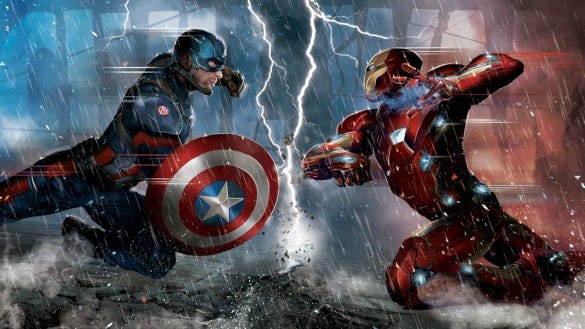The Importance of Marvel
We sat next to a little kid during “Captain America: Civil War” last night. He was engaged, smiling the entire time. Spider-Man. Giant-Man. Iron Man v. Captain America. And at the moment when Iron Man has Captain America bloodied, on the ground, on the ropes as it were, this kid knew exactly what was coming next.
“I could do this all day,” the boy whispered, as Cap stood up to Iron Man and said the exact same thing.
I imagine the boy recognized the scene from the trailers and knew what was coming, but that doesn't diminish the awe and excitement in his voice. He probably watched those trailers a million times. That level of engagement speaks volumes about the success of Marvel Studios. And because it is successful, there is often the question: is Marvel really producing good work? What are we really getting out of their films?

When used effectively, superhero stories function as gateway drugs into the world of storytelling, using compelling characters to tell stories in any genre. Many critics are eager to declare the rise of the Marvel Cinematic Universe (MCU) as a problem for serious cinema. They are missing the point. The MCU is as positively influential to the modern blockbuster and modern cinema as the original "Star Wars" or "The Matrix," imperfect films that also struck a cultural nerve. Against all odds, the MCU has maintained a creative drive across 13 movies, which are (mostly) exciting, interesting movies with unique approaches. Through their creativity, these films open up fans of blockbusters to a wider range of storytelling, cinema, and entertainment.
And making good blockbusters is important. These are films that define generations — "Back to the Future," "Star Wars," "Terminator 2: Judgment Day," "Jaws," "Die Hard," "Gone With the Wind," "The Adventures of Robin Hood." Successful, popular, high-quality. These movies launched a generation of movie lovers and moviegoers. The MCU has done something unique and unheard of, releasing a string of 13 blockbusters across the span of eight years, connecting them and rewarding audiences for returning with emotionally hefty quality product.
“Civil War” is good, in part precisely because it is a story you can only tell with almost every character having five-plus previous movies. To understand Tony Stark in this movie, it helps to remember what he's been through. Why Ultron was such a big mess for him, why losing Pepper Potts has left him completely destroyed. How the September Foundation is a massive departure for him and why keeping the Avengers together is so important to him, at all costs. On the flip side, understanding Captain America's singular and almost meat-headed belief in the individual versus the power of large groups, as well as his undying devotion to Bucky and "innocent until proven guilty" is bolstered by having seen his previous films. Sequels have, in rare exceptions, been complete shit cash-ins. That Marvel has committed to providing full story arcs from film to film, building so cleanly off of previous movies, is something to be lauded, not bemoaned. Just because doing this successfully is new doesn't mean it is negative.
It should be appreciated, too, that a kid like the one I sat next to will have an easy time finding his way from the MCU into broader cinematic horizons. The best MCU movies wear their influences on their shoulders. These films' directors, editors, producers and actors openly discuss the movies that inspired them and drove them to make specific creative choices. Contemporary fan culture is one of making connections — a generation raised on hyperlinks knows better how to follow information to its source than ever before (although it remains to be seen if they'll take the time, but I digress). I see complaints that somehow a large number of people seeing Marvel films dumbs down cinema as a whole, but bullshit.
There is so much more for me to learn, for me to understand about movies and film history. I take the Marvel films on their own terms. Even as I enjoy them, they make me want to know more, understand where they came from and the continued role they play in film history. “Civil War” speaks to the ongoing successes and power of the Marvel blockbuster, telling a complex story about characters who have grown and developed over the last decade, and its overall quality creates a trust in the brand that many, many future film fans can follow as they get older and look deeper into the production. In a world where independent filmmaking has never been as cheap, accessible or popular, it's a wonder and a gift to have blockbusters that shoot for the stars.


